 Janus Head Janus Head
11.1&2

Travels Inside the Archive
Robert Gibbons
Edge of Maine Editions

Beyond Time
New & Selected Work
1977 - 2007
Robert Gibbons
 The Age of Briggs & Stratton The Age of Briggs & Stratton
Peter Culley
|

China Monumentis
1667
Athanasius Kircher
(1602–1680)
via John Coulthart
_______________________
Three remarkable pieces on Blanchot and May 1968
Freedom of Speech: Blanchot and May 1968
Spurious
'Blanchot is not an ordinary man, a man whom you can meet in the street', says Levinas in an interview. But there he was on the streets, a demonstrator(Denis Hollier writes of his surprise at seeing him at an action committee, 'pale, but real ...'): what was Blanchot's role during May 1968, which he later called 'the most significant political and perhaps philosophical event in the last 20 years'?
A Literary Satellite: Blanchot and the Revue Internationale
Spurious
Immediate Speech
Spurious
There comes the moment in which, in Blanchot's image, the walls fall - in which the freedom of speech, understood as the response to the Other as the 'unknown-familiar' reveals itself in the open.
This, indeed, is what happened for Blanchot during the Events. Speech, for him, marks a relation to the Other that can be called immediate, as it escapes the constituting work of consciousness, answering to that worklessness (désoeuvrement) which roils in place of consciousness and its object.(....)
When the walls fall, the Other is revealed as being close to the night, close to death (dying being another word for worklessness, of a relation that escapes the constitutive work of consciousness).(....)
The revolt of May 1968, for Blanchot, was first of all a revolt of speech which the wall-writings and handbills confirm, answering as they do a capacity to say, to speak immediately that revealed itself in the action committees and demonstrations. But this is not an immediacy that places itself at my disposal - it is not revealed to a self that remains sure of its self and its capacities, including the capacity to be.......(more)
_______________________
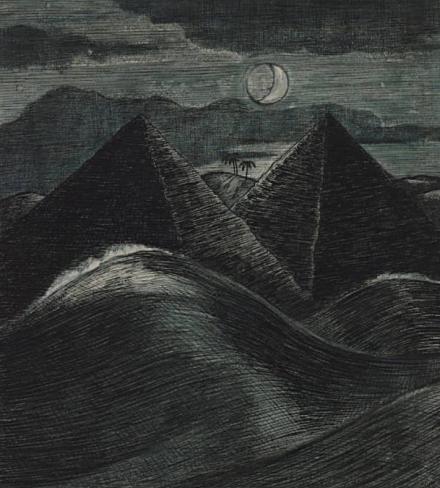
The Pyramids in the Sea
Paul Nash
1912
_______________________
'There was an oddness about that terrible day in May which is worth recording...."
How sad, ye gods, how sad the world is at evening, how mysterious the mists over the swamps. You will know it when vou have wandered astray in those mists, when you have suffered greatly before dying, when you have walked through the world carrying an unbearable burden. You know it too when you are weary and ready to leave this earth without regret; its mists, its swamps and its rivers ; ready to give yourself into the arms of death with a light heart, knowing that death alone can comfort you.
The magic black horses were growing tired, carrying their riders more slowly as inexorable night began to overtake them. Sensing it behind him even the irrepressible Behemoth was hushed, and digging his claws into the saddle he flew on in silence, his tail streaming behind him.
Night laid its black cloth over forest and meadow, night lit a scattering of sad little lights far away below, lights that for Margarita and the master were now meaningless and alien. Night overtook the cavalcade, spread itself over them from above and began to seed the lowering sky with white specks of stars.
Night thickened, flew alongside, seized the riders' cloaks and pulling them from their shoulders, unmasked their disguises. When Margarita opened her eyes in the freshening wind she saw the features of all the galloping riders change, and when a full, purple moon rose towards them over the edge of a forest, all deception vanished and fell away into the marsh beneath as their magical, trumpery clothing faded into the mist.
-
Michail Bulgakov (b. May 15, 1891), The Master and Margarita, translated by Michael Glenny
The Master & Margarita pages
Kevin Moss _______________________

"Bloody Thursday"
May 15, 1969
Photo: Kathryn Bigelow
People's Park History Page
1969 -- US: Battle for People's Park, fought against the University of California & the police in Berkeley, California, who had fenced the area off in the middle of the night:
Beloved & Respected Comrade Bad Actor Governor & Future President of the United States Ronald Reagan sends in National Guard to reclaim People's Park in Berkeley, California.
Police gunfire kills a bystander, James Rector, & wounds 60, including Alan Blanchard, blinded for life.
17 days of street fighting ensue, capped by a march of 30,000, where another 150 demonstrators are shot & wounded.
'If there has to be a bloodbath then let's get it over with'.
— Ronald Reagan
the daily bleed _______________________
when the wolves cease their baying:
the silences of Arcadia
blah-feme
It should be noted that the silence/noise relationship, the relationship between a blockage in the signal channel and its saturation (or breach), is not merely reciprocal, but intimately (ontologically) co-dependent. Pastorale, as one of the mechanisms enacted in the early modern courts of Europe by which the violent traumatic kernel at the heart of community was buried, enabled a mode of representation of that community in which one could ‘safely’ participate. Pro-pastoralist thinkers like Alpers have tended to imagine this participation not as a retreat or a kind of counter-factual delusion, but as a way of working through the problematic of representation itself. Certainly, one of the ways that the pastoral domain could function in Renaissance Italy, for example, was as a space for the (re)presentation of the body politic. The representational thesis, born of a recuperative pastoralism, thus holds that the pastoral forms of early modernity emerge in response to new demands for court socialisation. But what was it precisely about the greenwoods or Arcadia itself that occasioned so much cultural work? And why has it persisted so stubbornly? Why seek to cover over the violent core of abandonment that attends community?...(more)
_______________________
 detail
Sphinx Mystagoga
Athanasius Kircher
Pyramids. The dead and the living
Studiolum
Poemas del río Wang
_______________________
Solitude, Exile And Ecstasy
Theme And Variations In Words And Music
A radio music-drama devised by Bruce Charlton Copyright 1987
transcript
Broadcast BBC Radio 3 31 March 199
Words:
Henry David Thoreau - Ed Bishop
Hugh MacDiarmid - Ian Cuthbertson
Glenn Gould - Peter Marinker
Music: J.S. Bach - 'Goldberg Variations'
GOULD: [Low murmur of city traffic throughout] The north has fascinated me since childhood. In my school days, I used to pore over whichever maps of that region I could get my hands on, though I found it exceedingly difficult to remember whether Great Bear or Great Slave was farther north. The idea of the country intrigued me, but my notion of what it looked like was pretty much restricted to the romanticized, art-nouveau-tinged, Group of Seven paintings which, in my day, adorned virtually every second schoolroom, and which probably served as a pictorial introduction to the north for a great many people of my generation.
A bit later on, I made a few tentative forays into the north and began to make use of it, metaphorically, in my writing. When I went to the north, I had no intention of writing about it, or of referring to it, even parenthetically, in anything that I wrote. And yet, almost despite myself, I began to draw all sorts of metaphorical allusions based on what was really a very limited knowledge of the country and a very casual exposure to it. I found myself writing musical critiques, for instance, in which the north - the idea of the north - began to serve as a foil for other ideas and values that seemed to me depressingly urban-oriented and spiritually limited thereby.
Now of course, such metaphorical manipulation of the north is a bit. suspect, not to say romantic, because there are very few places today which are out of reach by, and out of touch with, the style and pace-setting attitudes and techniques of Madison Avenue. Time, Newsweek, Life, Look and The Saturday Review, can be airlifted into Frobisher Bay or Inuvik, just about as easily as a local contractor can deliver them to the neighborhood news-stand, and there are probably people living in the heart of Manhattan who can manage every bit as independent and hermit-like an existence as a prospector tramping the sort of lichen-covered tundra that A.Y. Jackson was so fond of painting north of Great Bear Lake.
Admittedly, it's a question of attitude, and I'm not at all sure that my own quasi-allegorical attitude toward the north is the proper way to make use of it or even an accurate way in which to define it. Nevertheless, I'm by no means alone in this reaction to the North; there are very few people who make contact with it and emerge entirely unscathed. Something really does happen to most people who go into the north - they became at least aware of the creative opportunity which the physical fact of the country represents and, quite often I think, come to measure their own work and life against that rather staggering creative possibility - they become, in effect, philosophers. ...(more)
via Peter Culley
_______________________
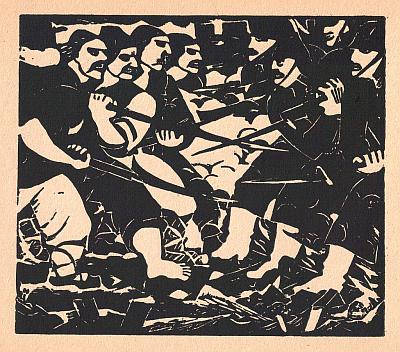 Clash
Whettering the Scythe
Gyula Derkovits
1928
From the collection of Richard Sica
_______________________
Winnipeg General Strike
May 15 - June 26th, 1919
_______________________
Goldman Sachs and the Vatican: Two Cultures of Infallibility
Stephan Richter
_______________________
Glenn Beck, America's Historian Laureate
Greg Grandin
...historical analysis is about making connections, and there is, in fact, coherence to the Tea Party version of history, which allows conservative cadres not just to interpret the world but to act in it. And yes, it is all about race.
_______________________
Separating Fact from Fiction: My Fair Copyright Proposals
Michael Geist
For me, copyright matters because I am a professor and my students need access to copyrighted materials and the freedom to use those materials. It matters because I am a researcher who needs assurance that as materials are archived they will not be locked down under digital rights management. It matters because I am deeply concerned about privacy and fear that DRM could be harmful to my personal privacy. It matters because I have created videos and need flexibility in the law to allow for remix and transformed works and do not want my content taken down from the Internet based on unproven claims. It matters because I am a writer and I need certainty of access to speak freely. It matters because I am a consumer of digital entertainment and I want the law to reasonably reflect the right to view the content on the device of my choice. It matters because I am a parent whose children have only known life with the Internet and I want to ensure that they experience all the digital world has to offer. It matters because I live in a city with a strong connection to the digital economy and we need forward-looking laws to allow the next generation of companies to thrive. It matters because I am a proud Canadian who wants laws based not on external political pressure, but rather on the best interest of millions of Canadians....(more)
_______________________
Rejoice, Liars
Rejoice, the witch of truth has perished
Of her own will -
Falling to earth humanly
And rising in petty pain.
It was the last grandeur,
When the witch crashed
And had a mortal laming.
And quick hearthturned to blood
Those fires of speculation
Where she burned long and coldly.
Away, flattery, she has lost pride.
Away, book-love, she has a body.
Away, body-love, she has a death
To be born into, an end to make
Of that eternity and grandeur
In which a legend pines till it comes true -
When fawning devil boasts belief
And the witch, for her own honour,
Takes on substance, shedding phantomness.
- Laura Riding
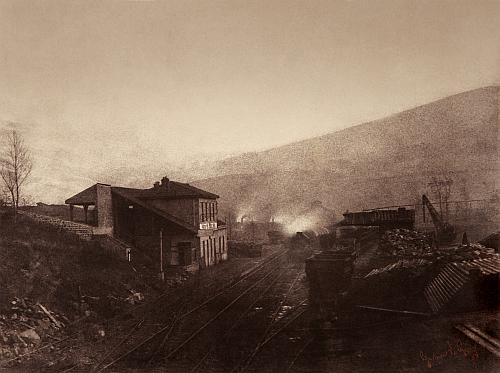
Train station and coal depot
Gustave Le Gray
1820 - 1884
scanned by Uno Lindstrom
Ride the Night Train with Vladimir Nabokov, Marcel Proust and L.-F. Céline
at Tom Clark's Beyond the Pale
_______________________
Night of the Il y a
Dylan Trigg
December 01, 2006
The horror of the “there is” is crystallised in the unending night of the insomniac. Levinas does not have in mind any such existentialist “angst,” in which consciousness is faced with its own nullity in the still nothingness. Nor does this entail Heidegger’s “the Nothing,” which becomes an ontic mode experienced (falsely) in anxiety. Such a mode is undermined through Levinas’s analysis insofar as the “I” is called into question. At first, insomnia appears to presence consciousness as a remainder, a force which resists its closure. Yet consciousness is not simply “here” waiting for the night to end and for sleep to begin. In Ethics and Infinity, he writes: “The impossibility of escaping wakefulness is something ‘objective” […] This impersonality absorbs my consciousness; consciousness is depersonalized. I do not stay awake: ‘it’ stays awake”.
Where is the “I” in this ontological rupture?...(more)
_______________________

David Byrne
b. May 14, 1952
_______________________
Toward a Theory of Critical Computing:
The Case of Social Identity Representation in Digital Media Applications
Fox Harrell
ctheory
"Why should the computer scientist read African-American poets? What does information science have to do with race-critical or feminist methods and metaphysics? The collective wisdom in those domains is one of the richest places from which to understand these core problems in information systems design: how to preserve the integrity of information without a priori standardization and its often attendant violence. In turn, if those lessons can be taken seriously within the emerging cyberworld, there may yet be a chance to strengthen its democratic ethical aspects."
- Geoffrey C. Bowker and Susan Leigh Star, Sorting Things Out: Classification and Its Consequences.
(....)
Everyday computing activities require users to construct computational identities. Computational identities are not mediated only by social interaction, but by the particular implementations used to instantiate them. This means that a great deal is at stake when these technologies are developed. If they are developed without mindfulness of the limitations of folk or everyday models of identity, then prejudice, stereotyping, static classifications, and inequitable access to resources will be perpetuated in computational applications and environments. Yet, how many computer scientists developing social networking, e-commerce, gaming, or educational applications consider the latest theories of social classification from sociology or theories of conceptual stereotyping from cognitive science? The quotation by sociologists Geoffrey Bowker and Susan Leigh Star beginning this section suggests that, looking outside of the field of computer science, there exists rich information and identity construction strategies developed by individuals who have had to navigate the shifts, convolutions, and problems of social identity. The reliance of computer scientists on intuitive understandings of identity, rather than nuanced theories that view identity as enacted, infrastructural, and imaginative, has resulted in software that at best ignores opportunities for empowerment, and at worst results in perpetuating longstanding social ills of discrimination and disenfranchisement. We can do better.
Improving upon this situation is not a technical issue alone. ...(more)
_______________________

Katrien Franken
via Ben Hayattayken
_______________________
Thinking Freely:
New Business Models for the Digital Economy
David Campbell
Free. If there’s one word that divides people and raises hackles it’s ‘free’. Things do cost and we do want to get paid so how can free make financial sense? Like all contentious concepts, free has lost much of its meaning in its transition from economic idea to bête noir of traditional business. It is time to go back to the beginning and appreciate what ‘free’ involves and for whom it makes sense. I will be using Christopher Anderson’s book Free: The Future of a Radical Price as a guide, which will take us to some unexpected places for those who think its argument is no more than its title....(more)
_______________________
Atmospheric Alienation, Carbon Tracking and Geo-Techno Agency
Anita Girvan
ctheory
I offer "atmospheric alienation" as one way of thinking through and flagging emerging concerns within the phenomenon of climate change. The hypothesis of atmospheric alienation builds on Hannah Arendt's notion of Earth alienation, which explicitly interrogates genealogies of 'modern science', uncovering the ways in which practices in science, cultural thought, and biophysical materiality enter into recursive feedback loops with political (and planetary) consequences. Arendt's timely intervention in political thought during the mid-twentieth century insists on a politics of reflexive thinking and deliberative dialogue, against a seemingly inevitable techno-scientistic determinism in which technology is recognized to have outpaced a human capacity for understanding. Her imperative to "think what we are doing" is of the utmost importance in the emerging high stakes politics of climate change. ...(more)
_______________________
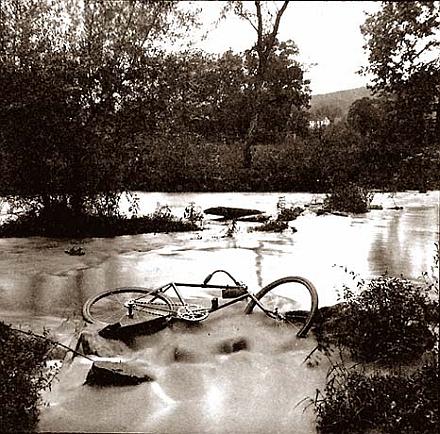
Francis L. Cooper
1874-1944
Avocational Photographer
The world of Francis Cooper:
nineteenth-century Pennsylvania photographer
Jay Ruby
google books
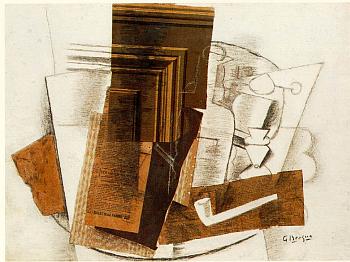
Bottle, Newspaper,
Pipe, and Glass
Georges Braque
1913
_______________________
Three Poems
David Chaloner
1944–2010
paradox
mind's blank
interface to reflection
imperious sky
water shrugs
where blind earth rests
still & compliant
imaginations border
warps ancient meadows
wrapping pollarded willows
in a flurry of inconsistency
backward I have dreamed
this worrisome day
no one speaks
we are elements in complex
fabrications of time
made precious
through fearful prediction
the wound core
words cauterize
grown thick like a cloud
loaded with moisture
all day we said the wind
no longer relevant
as summer passes
long and low autumn
shortens daylight gold
words and ideas
play music
to the hurt of stillness
and thwarted imagination
...(more)
Great Works: Issue 15: November 2009
innovative writing: modernist / postmodernist / archaic _______________________
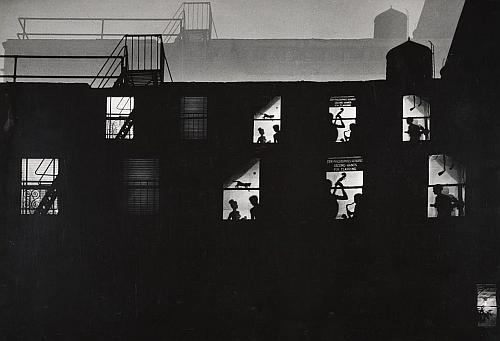
The Jazz Loft Project
W. Eugene Smith
via Jim Johnson
_______________________
Lost on the Fearless Plain
Big Brother's got that ju-ju, Gaia's got the blues -- hologram, carry me home
Joe Bageant
(....)
Ahhhh … Safely in the American national illusion, where all the world's a shopping expedition. Or a terrorist threat. No matter, as long as it is colorful and wiggles on the theater state's 400 million screens. Plug in and be lit up by the American Hologram.
This great loom of media images, and images of images, is so many layers deep that it has replaced reality. No one can remember the original imprint. If there was one. The hologram is a hermetic snow globe, a self-referential circuitry of images, and a Möbius loop from which there is no logical escape. Logic has zilch to do with what is going on. The smallest part holographically recapitulates the whole, and vice versa. No thinking required, we just cycle and recycle through an aural dimension. Not all that bad, I guess, if it were not generated by forces out to fuck every last pair of eyeballs and mind plugged into it....(more)
_______________________

Parrot cage
from Sussex Lunatic Asylum
1859-1939
Mental health and illness
UK's Science Museum
via Mind Hacks
_______________________
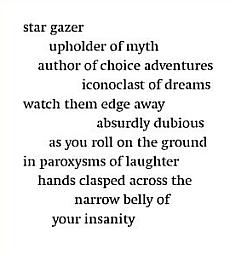
Collected poems
David Chaloner
salt
_______________________
Hugh Macdiarmid: Toward a Materialist Poetics
E. San Juan, Jr.
via mosses from an old manse
_______________________
Present perfect, or the time of post-socialism
Ozren Pupovac
How can we characterise our time – the time of us, inhabitants of the epicentres of the capitalist restoration that unfolded after the year 1989? Above all, the time that we inhabit is an odd time. The year 1989, it is difficult to conceal this, opens an odd chapter in history: a chapter of historical oddities. What is it exactly that begins with 1989? If we look at the question a bit more carefully, we cannot but be struck by the paradoxical play on time that history presents us with here. Every beginning is difficult, as one philosopher famously remarked, but the beginning of the so-called "post-socialist" situation seems to be particularly neuralgic. For what we have here is a very peculiar beginning: a beginning that already seems one step behind itself, already one step in the past.
How does post-socialism begin? The troubles of the post-socialist beginning begin at the level of nomination. As its name already shows, the post-socialist situation bears an immense mark of the past. The mark of an end. The beginning of post-socialism, its historical inception, immediately presents itself as an end, a beginning in and through an end: the end of socialism, the end of communism. This end is an exhilarating one: the end of a perceived disaster, the liberation from the torments and horrors of a "deadly illusion" to which Cold War ideology attributed the criminalising name of "totalitarianism". But is this projection of an end, this negativity, all there is? Is post-socialism simply an announcement of something that has ended, something that has passed? Because one might also ask: What is it that begins, properly speaking, after the end? Is there something that post-socialism can claim as its own beyond the simple fact of the negation of its anteriority? Then again, is there a beginning here in the first place? ...(more)
_______________________
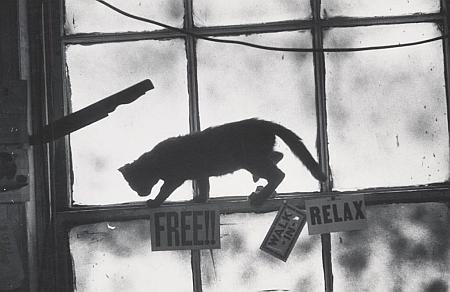
W. Eugene Smith
1 2 3
_______________________
This
Nico Vassilakis
drunken boat
(....)
The futility of standing in a hallway with my work xeroxed and enlarged—tacked up to show its transparency. An ebook printed out and shown at a gallery. Can that be something? It might be, I simply can’t tell.
Lines are being drawn. Have been drawn. There is no purchase stable enough to steady myself. Any belief is strewn with haphazard entries that undo sturdy conclusions. Second-guessing along as you go. This is derivative too.
A misplaced item is a displaced item that stands out waiting to be recovered.
This structure is nervous—the zeal has left and what remains is an emptiness of lack, of confidence. The sense that I am to be my own words—however vague or dry they have become—is a sinking feeling that is to be faced right up at the microphone. Always faced with being false or the regret of momentum’s end.
The outcome was a hangover hook that suited the scene. A dismal prep with a fine cannon shot. In other words, I found my clown center and made the reading lift off the ground.
...(more)
Life in a Time of ContractionDrunken Boat #11

Elemental
Stefan Loeliger
still dancing
_______________________
35 Sonnets
Fernando Pessoa
Project Gutenberg
Whether we write or speak or do but look
We are ever unapparent. What we are
Cannot be transfused into word or book.
Our soul from us is infinitely far.
However much we give our thoughts the will
To be our soul and gesture it abroad,
Our hearts are incommunicable still.
In what we show ourselves we are ignored.
The abyss from soul to soul cannot be bridged
By any skill of thought or trick of seeming.
Unto our very selves we are abridged
When we would utter to our thought our being.
We are our dreams of ourselves, souls by gleams,
And each to each other dreams of others' dreams.
_______________________
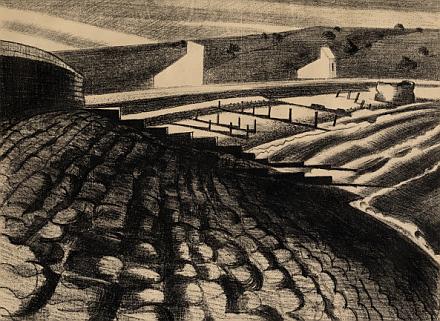
Dymchurch
The Strange Coast
1920
Paul Nash
b. May 11, 1889
_______________________
Ingeborg Bachmann poems
Introduced by Hilary Kassman
Days in White
(Tage in Weiß)
These days I rise with the birches
and comb my wheaten hair from my brow
before a mirror of ice.
Mingling with my breath
the milk curdles.
This early it foams easily.
And where I breathe on the window,
there appears once again,
drawn by a child's finger,
your name: Innocence.
After all this time.
These days it doesn't torment me,
that I can forget
and must remember.
...(more)
The Bow-Wow Shop 5 - an international poetry forum .....................................................
Three poems
Ingeborg Bachmann
translated by Johannes Beilharz
jacket
Reading Ingeborg Bachmann
John Taylor reviews Malina
Having written her doctoral dissertation on Heidegger’s existential philosophy, Bachmann was also fully cognizant of his idea of a genuine writer’s or poet’s getting unterwegs zur Sprache ("on the way to Language"). And it is as a description of how a writer "heads toward Lan-guage" that Malina, as a meta-novel, must also be read.
Yet herein lies another paradox. This principal, most significant activity of the narrator’s life cannot be observed; the novel can only attempt to help us see what cannot be seen. In her acceptance speech for the Anton-Wildgans-Preis, received in 1972, Bachmann pointedly commented: "I exist only when I am writing. I am nothing when I am not writing. I am fully a stranger to myself, when I am not writing. Yet when I am writing, you cannot see me. No one can see me. You can watch a director directing, a singer singing, an actor acting, but no one can see what writing is." In this sense, the narrator and perhaps also Malina are "nothing," "no one," in the novel. At best, they are apparitions or strangers. They exist authentically only in what is unstated, in what cannot be told. Bachmann leaves us with the redoubtable task of grasping their essence "behind the novel," as vital sources that can be intuited yet not named....(more)
The book of Franza & Requiem for Fanny Goldmann
Ingeborg Bachmann translated by Peter Filkins google books
Waggish on The Book of Franza, Ingeborg Bachmann
_______________________
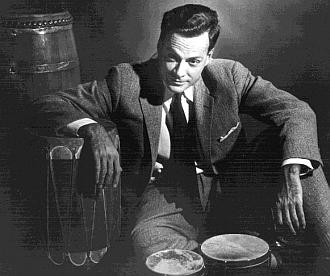
Richard Feynman
b. May 11, 1918
Nobelist Physicist, teacher, storyteller, bongo player
... this long history of learning how not to fool ourselves--of having utter scientific integrity--is, I'm sorry to say, something that we haven't specifically included in any particular course that I know of. We just hope you've caught on by osmosis.
- Richard Feynman, Cargo Cult Science
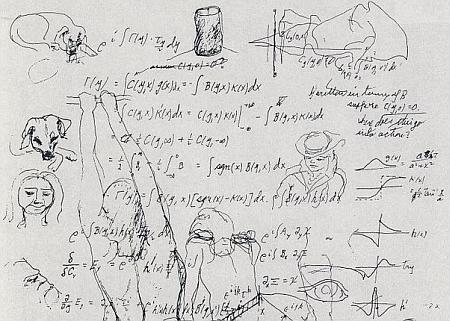 detail
Sketches and Paintings by Richard Feynman
_______________________
The Subversive Scribe: Translating Latin American Fiction
Suzanne Jill Levine
Review by Chad W. Post
For far too long now, the translator has been relegated to the rear-facing backseat of the literary world; the ever-so-smaller “translated by” name towards the bottom of the title page that few people (save those of us passionate about literature in translation) give more than a cursory glance to. But in Suzanne Jill Levine’s book, The Subversive Scribe: Translating Latin American Fiction, the translator’s role is at last given full and detailed attention in a vibrant and unique way. Levine’s goal with her book is to:
Make the translator’s presence (traditionally invisible) visible and comprehensible…Far from the traditional view of translators as servile, nameless scribes, the literary translator can be considered a subversive scribe. Something is destroyed—the form of the original—but meaning is reproduced through another form.
At its heart, The Subversive Scribe is about the creative collaboration between writers and how writers perceive their own processes of writing. Levine takes the reader on a compelling journey in which she lyrically describes her personal journey as a translator, and details how she fell in love with Latin American literature. Part memoir, part literary criticism, and wholly fascinating, The Subversive Scribe offers an inimitable insider’s perspective into the vital role translators play in world literature today. ...(more)
_______________________
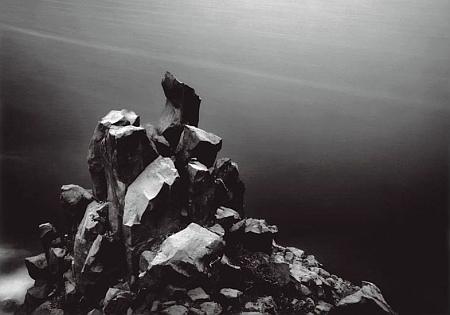
Moonlight
West, Southwest
The Mid Atlantic Ocean
2004
Thomas Joshua Cooper's best shot
_______________________
Tangling with History [PDF]
Rebecca Stott
Cambridge Literary Review, I/1
Isaac newton bought a glass prism at a stall at Stourbridge Fair in August 1665, probably on or close to the spot where mechanics now fit replacement windscreen wipers or exhausts onto Renault cars in the garage on Mercer’s Row. It was a three-sided wedge of glass about eight inches long. Determined to discover the physics of colour, the reclusive student had started a series of experiments with light in his rooms in Trinity. To buy the prism, he’d almost certainly walked to Stourbridge Common, along a path that the Newmarket Road follows now, with questions lurching around in his head, his eyes still sore from the series of optical experiments he’d already begun. Over the following year, the prism that he bought that day, and others he bought later, helped him to work out what the painters in Delft were also discovering in other ways at the same time—that white light was not pure, but was made up of colour. In the event, few people cared much, for England was in the grip of plague, but it would come to matter a great deal later.
(....)
Can a novel be a contribution to historical knowledge in any meaningful sense? What might a historical novel know that a history book might not know if both writers are working with the same materials, if both stand there peering into the void, into what is unknowable? Is there any advantage that historical fiction might have over a history book in providing knowledge of the past? And, though it might be all very well to write a fictional story about the origins of an important piece of seventeenth-century glass or to speculate for fictional ends on Newton’s relationship with a certain “Mr F” inscribed in his journal, how do you begin to speculate on why Newton wrote a list of 48 sins in a secret code in a notebook written in 1662? What might Newton have felt about risking the streets of Cambridge during a plague summer?
_______________________
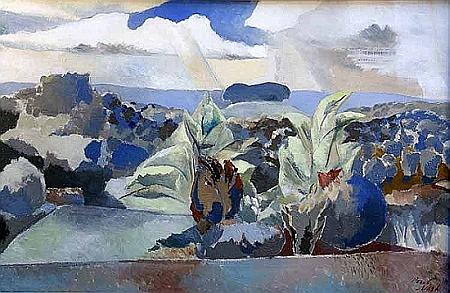
Landscape of the Bagley Woods
Paul Nash
1942-3
_______________________
Whatever Works
Woody Allen’s world
interview by Robert E. Lauder
why do you continue to make films?
Well, you know, you want some kind of relief from the agony and terror of human existence. Human existence is a brutal experience to me…it’s a brutal, meaningless experience—an agonizing, meaningless experience with some oases, delight, some charm and peace, but these are just small oases. Overall, it is a brutal, brutal, terrible experience, and so it’s what can you do to alleviate the agony of the human condition, the human predicament? That is what interests me the most. I continue to make the films because the problem obsesses me all the time and it’s consistently on my mind and I’m consistently trying to alleviate the problem, and I think by making films as frequently as I do I get a chance to vent the problems. There is some relief. I have said this before in a facetious way, but it is not so facetious: I am a whiner. I do get a certain amount of solace from whining. ...(more)
Woody’s Cold ComfortsRobert E. Lauder's reflection on this interview
via paperpools
_______________________
"Good Warm Sad Blood
Spilling Out in the Forest"
Gulf Coast magazine explores the new surrealism
a conversation with Heather Christle, Hannah Gamble, Matthew Rohrer, Zachary Schomburg, and Matthew Zapruder
_______________________

Stefan Loeliger _______________________
John Tranter poems
Blackbox Manifold 4
Lateral Sclerosis
Small loans are the ruin of the older folk in
Country Antrim, but in nearby Muckamore
they’re laughing. Mr. Sillars went over them
carefully -- we all want that reporter off-limits --
and the letter he provided for a signing-on fee
seemed valid. Getting the focus right is hard:
thirty dollars on the one hand, one billion euros
on the other: one hungry family is a tragedy,
a million a statistic. This information is useless.
I want to go back, out of the bad stories.
Be sure to include some of the rebels in the army.
And carry a gun. If they can put up with their comrades
their mournful future will take on a classical look,
like a military history getting ready to be recorded.
more
Blackbox Manifold 4

La Pluie
1904
Mikhail Larionov
d. May 10, 1964
_______________________
Blogging Toward The Kingdom
Booze, rage and justice in the participation age
Joe Bageant
... it is the straight sober world and its truths that are hard. Alienation. Inner rage. Many of my essays were born in an attempt to communicate working class alienation, separation and rage -- which is the same as middle class rage, but self-described and expressed differently). Most of the liberal thinkers I know still do not grasp that the anxiety working people have, even the Tea Partiers, are rooted in the same things as their own. Yes, the right is definitely cruel. And yes, it can by now be called fascist. However, to deal with what has happened, one must come to grips with what produced the internal distrust upon which fascist empires are built.
The brutal way Americans were forced to internalize the values of a gangster capitalist class continues to elude nearly all Americans. Most foreigners too. This is to say nothing of how our system replaced our humanity with ideology, our liberty with money, and fostered fascist nationalism through profound degeneration of the people's mind and spirit. It's not as if one can ever escape that sort of thing, either by going to a place like Mexico, getting drunk or whatever. We are made in Americas' image, whether we admit it or not, and America's image is the face on a ten dollar bill.(....)
It is now clear to me that the people's rage is a tool in the hands of the new electronic and digital corporate state. Its various channels, eddies and pools, regardless of type, can be directed toward all sorts of mischief and profit. Left or right, the angry throngs on both sides can be managed and directed. They can be sent chasing various injustices, denouncing evil characters on Wall Street, Times Square bombers, BP executives, or whatever, worked up into slobbering outrage over Sarah Palin, and thus kept divided and working against each other for the benefit of last gasp capitalism.
Once outside the furious drek of American political and economic life, and having finished the last book I will ever write, I found myself asking: "Why did the good in the American people not triumph? How can it be that so many progressive, justice-loving citizens failed? Their positions were well reasoned. The facts were indisputably on their side. Obviously, there was, and is, more going on than merely losing battles to demagoguery and meanness. Why do we lose the important fights so consistently? What has kept us from establishing a more just kingdom? Something is missing.(....)
The blinking reptilian elites now own our entire material needs hierarchy chain, top to bottom. You eat, shit, work, fuck and die at the pleasure of their Great Machine. The presence of six billion others, most of whom are in the same situation, all but guarantees this as our material destiny on a finite and increasingly poisoned planet, before the big hasta la vista....(more)
_______________________

L'été
1912
Mikhail Larionov
_______________________
With ‘ Hat In Hand ‘ : American Serfdom
Philip A Farruggio
Conversations in offices, supermarket lines, health clubs, job sites.... Everywhere it seems, are about the ‘ scandal of the day ‘ involving the rich and famous. Never do you hear discussions about the trillion dollar phony bank bailouts, or trillion dollar phony wars we taxpayers fund. The latest conversation piece, the one in between Tiger Woods and Lawrence Taylor, is about how much the stock market has folded this past week.....never about what Goldman Sachs did to the Greek government to cause their crisis. Or the news about how the Greek 9 to 5 working folks are not taking this like we here take everything. They are out, in the streets, demanding better answers instead of just taking it all on their backs and their wallets. Yet, here in La La land, all I hear from my friends is how much they are losing in their portfolios. Instead of having contempt and righteous anger for the one percent who seem to get all the breaks from this government, my neighbors walk right into the trap of ‘ Wanabee ‘. ...(more)
_______________________
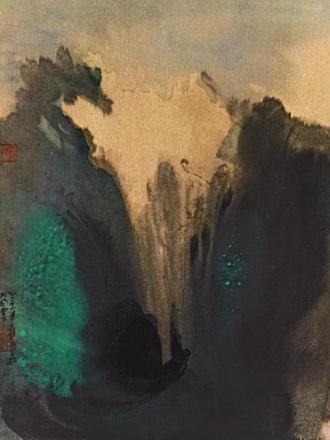
Zhang Daqian
_______________________
Left, Right and Center – a self-righteous rant
Eiríkur Örn Norðdahl
One of the greatest conservative projects in poetry is called New Formalism. In short it supports the return to rhymed metrical verse and classical themes. It’s a let’s-write-like-Keats kinda movement originally associated with the yuppie culture of the 1980’s, with that perverted type of pseudo-sophistication that makes most modern day readers think of Patrick Bateman and his cronies – or Gordon Gekko. Lubricious slickers with a peculiar need to associate themselves with a bygone golden age while simultaneously proclaiming themselves as “the true new” of poetry (‘hey, look at me, I’m neo-Keats!’). This is poetry for a Roman master race; this is the right wing of poetry; this is literature for those who seek a moral center and a sense in poetry, and find both in nostalgic form and subject-matter.
Can you tell that I don’t care for it much?
Well, alright, I’ll admit I do get some pleasure out of it. My problem is more with the philosophy behind it than the parlour-game of pentameter per se. I’m no enemy of form or rigorous sportsmanship in poetry – both form and rigour are key traits of most experimental poetry, which is the part of the park I prefer to play in. But New Formalism’s spite towards modernism in particular, and modernity in general – not to mention its teeth-grinding spite towards experimental poetry – is so violently geriatric in its appeal that it verges on necrophilia....(more)
_______________________
What Are You Looking At?
Photographers, Film-makers and Writers on Voyeurism
Civilian and military surveillance, mobile phone photography, celebrity snaps... the clandestine photographer has a long history. To coincide with a large Tate Modern survey of such images from the late nineteenth century to the present day, TATE ETC. brings together a selection of photographers, film-makers and writers to explore how familiar themes of eroticism, fame and conflict continue to pose the question: who is looking at whom?
TATE ETC.
Peace and the Politics of Freedom
Neil Cox on Picasso and Politics
A Visionary Projection of the Landscape of the Soul
Jean-Christophe Ammann on Stanley Spencer
_______________________
A Little Larger Than the Entire Universe: Selected Poems
Fernando Pessoa
translated by Richard Zenith
pdf at aaaarg - free reg. req.
Live with nostalgia for the moment
Even as you live it...
We’re empty boats, blown forward
Like loose strands of hair
By a long and steady wind, living
Without knowing what we feel or want...
Let’s make ourselves aware of this
As of a still pond
In the midst of a torpid landscape
Under a desolate sky,
And may our self-awareness
No longer be roused by desire...
In this way, equal to the whole hour
In all its sweetness,
Our life, no longer us, will be
Our pre-wedding: a color,
A fragrance, a swaying of trees,
And death won’t come early or late...
What matters is that nothing matter
Anymore...Whether Fate
Hangs over us or quietly and obscurely
Lurks in the distance
Is all the same...Here’s the moment...
Let’s be it . . . What good is thinking?
11 October 1914
_______________________
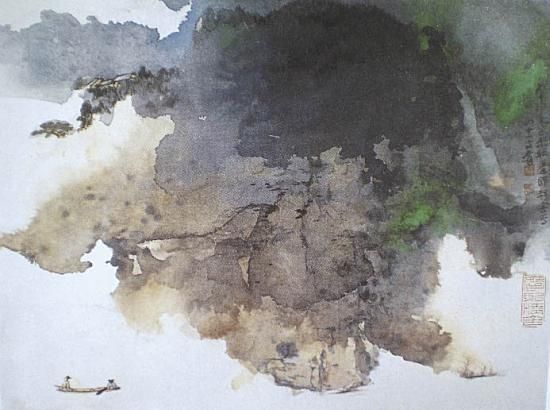
Returning Boat on a Spring River
Zhang Daqian
b. May 10, 1899
_______________________
Firesticks
Conjugations of the verb "to be"
asleep since Adam's fall
wake from bad phosphor dreams
heavy with mineral desire.
Earthstruck they leave
their ferny prints of spines
in beds of stone
and carry private moons
down history's long roads,
gaudy with flags.
The one they walk behind
who's named "I AM"
they chose with spurts of flame
to guide them down
like the pillar of a cloud
into the mind's white exile.
from "The Layers"
in The Poems of Stanley Kunitz 1928 - 1978
in The Collected Poems
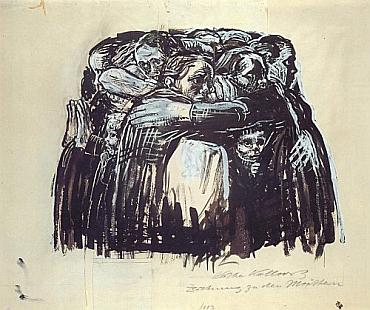
the mothers
1921
Käthe Kollwitz
1867-1945
Käthe Kollwitz: A Portrait of the Artist
Galerie St. Etienne
_______________________
Mothers' Day Proclamation
Julia Ward Howe
Boston, 1870
Arise, then, women of this day! Arise all women who have hearts,
whether our baptism be that of water or of fears!
Say firmly: "We will not have great questions decided by
irrelevant agencies. Our husbands shall not come to us, reeking
with carnage, for caresses and applause. Our sons shall not be
taken from us to unlearn all that we have been able to teach
them of charity, mercy and patience.
We women of one country will be too tender of those of another
country to allow our sons to be trained to injure theirs. From
the bosom of the devastated earth a voice goes up with our own.
It says "Disarm, Disarm! The sword of murder is not the balance
of justice."
...(more)
'In the Name of Womanhood and Humanity...'What is now widely viewed as a sentimental tribute to family -- Mother's Day -- was originally a call for women to wage a general strike to end war.
Geov Parrish
"Mothers' Day for Peace"
MOTHER'S DAY was born from the dream of a devoted activist and mother who first organized women into public health brigades, and then founded "Mothers Friendship Day" to reconcile communities torn apart by the U.S. Civil War. A few years later, a new "Mothers' Day for Peace" began with a call for women to unite across national boundaries to end war. For over fifty years, Mother's Day was about women working together for a better world.
Let’s take back Mother’s Day from the throes of commercialism and honour women around the world working for change! Because all our mothers deserve a little peace and justice.
-
Sandy Haksi
_______________________
Rethinking resistance
Feminism and the politics of our selves
Amy Allen
eurozine
_______________________

The Heritage of Motherhood
ca. 1904
Gertrude Kasebier
(1852-1934)
Artful Ambitions/An Art of Its Own
George Eastman House
_______________________
Canada's G8 health leadership
Lancet editorial
...a few key elements are missing from the framework. For example, there is no talk of emergency obstetric care. This omission is likely to be an oversight and should be rectified. Improving access to safe abortion services is also absent from the plan. Sadly, this omission is no accident, but a conscious decision by Canada's Conservative Government not to support groups that undertake abortions in developing countries.
This stance must change. 70 000 women die from unsafe abortions worldwide every year. The Canadian Government does not deprive women living in Canada from access to safe abortions; it is therefore hypocritical and unjust that it tries to do so abroad. Although the country's decision only affects a small number of developing countries where abortion is legal, bans on the procedure, which are detrimental to public health, should be challenged by the G8, not tacitly supported. Canada and the other G8 nations could show real leadership with a final maternal health plan that is based on sound scientific evidence and not prejudice....(more)
_______________________
Mother’s Day poems
from the Poetry Foundation’s archive.
_______________________
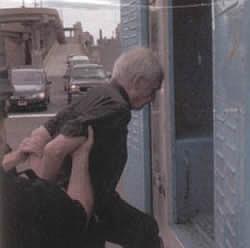 Once more into the paddy wagon
Daniel Berrigan
b. May 9, 1921
The kings and their gods: the pathology of power
Daniel Berrigan
google books
The Catonsville Nine
Plowshares Eight _______________________
Sonnets
Bernadette Mayer
exquisite corpse
Cardinal Flowers
Bernadette Mayer
when in the course of human events
I summon up remembrance of the walk we took
I see nothing, I don’t see, maybe I was blind
or so enraptured by the sights of the creeks
- how many things can you keep in mind
at once? - I said I didn’t see those creeks
but I did except I cant remember anything
now I’ve both lied & lost this sunny memory
so recently stored away in a manger
no crib for a bed, the little lord pathway
- “I wonder if I should drink coffee” -
now I remember less than nothing, what
does that mean? - I feel so attabled I might
be the someone else I threatened my sister with
being & nothingness
...(more)
Bernadette Mayer at EPC and The Poetry Foundation
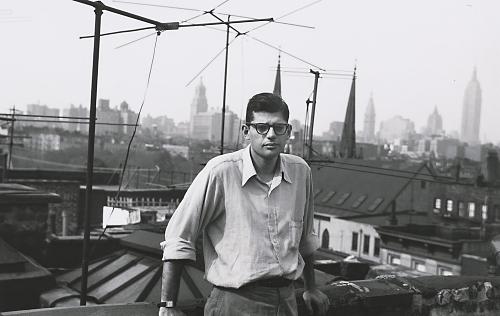
W. S. Burroughs
at rest
1991
Beat Memories: The Photographs of Allen Ginsberg
May 2–September 6, 2010
National Gallery of Art in Washington, D.C.
via The Allen Ginsberg Project
_______________________
Out of the mouth of the old order
Roger Gathman
We forget how often our nineteen century ‘thinkers’ lived in the aftermath of the hot breath of the ancien regime, which had burned their parents and grandparents. This was especially the case with Soren Kierkegaard, who carried within him the anguish of his father, Michael – or rather, Michael as the boy Soren never knew, one of the karler, a shepherd boy who cried out in the harsh night and loneliness of the Jutland plain.(....)
And so it happens that one shepherd boy in this culture that has long operated as a Moloch to such shepherd boys – one that has long made them the object of suspicion and accusation (literally – contemporary researchers have been surprised, mining the criminal archives of Europe, that bestiality outranks sodomy in those files, and the shepherd boy is often accused) – gets an opportunity. Much like a character in Balzac, he is the beneficiary of the attenuated but still active family network that connects the country to the city, the pious harsh Jutland peasant to the drygoods store in Copehagen. It was wool and the small colonial commodities (the song of sugar, spice, tobacco all over again – our familiar spirits) that made Michael Kierkegaard a relatively well off man.
But – according to his son – at the center of that story of upward mobility is a small boy cursing God on a Jutland Heath.
I want this rural background, since the next threads – mostly about Kierkegaard and boredom – are going to be very urban. We forget that rural sorrows and terrors are carried to the city as much as the city reciprocates with spices and money. ...(more)
_______________________
Old Bones
Gary Snyder
Out there walking round, looking out for food,
a rootstock, a birdcall, a seed that you can crack
plucking, digging, snaring, snagging,
barely getting by,
no food out there on dusty slopes of scree—
carry some—look for some,
go for a hungry dream.
Deer bone, Dall sheep,
bones hunger home.
Out there somewhere
a shrine for the old ones,
the dust of the old bones,
old songs and tales.
What we ate—who ate what—
how we all prevailed.
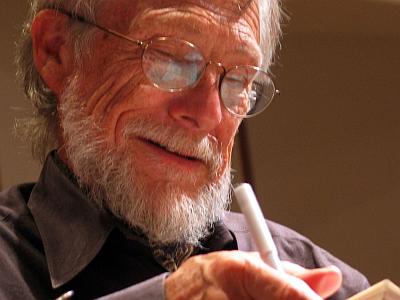
Gary Snyder
b. May 8, 1930
photo by Christian Martin 2006
Nathaniel Tarn: From Anthropologist to Informant, a Field Record of Gary Snyder Part One and Part Two
courtesy of Jerome Rothenberg
Poems and Poetics
The Back Country
Gary Snyder
google books
Gary Snyder at The Poetry Foundation
Buddhist Anarchism
Gary Snyder
1961
bureau of public secrets
Mountains and Rivers Without End
Gary Snyder
google books _______________________
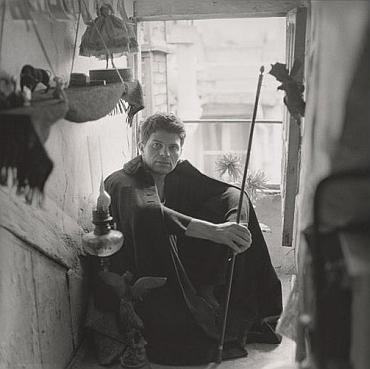
Gregory Corso
1956
Poetry In Allen Ginsberg's Photography
Claire O’Neill
_______________________
Agnomia
Róbert Gál
transl. from the Slovak by Michaela Freeman
exquisite corpse
This is a tautology of every moment, as if every moment was necessarily a tautology.
“It seems undignified,” says Jan, “to accept congratulations for the past, as if that from the past, which is not subject to a time shortcut, was totally irrelevant. This is not a criticism of heroism, but a criticism of the need to place heroism out for adulation, as if every heroism was necessarily admirable – and not some other one. Isn’t this the conventional exchange of the act of socially defined heroism for an act of heroism which is highly individual, and thus socially undefinable? Where is the boundary between the need of a heroic act of a socially defined hero and the need of a heroic act of a hero, who is defined by this act itself into the position of a partaker of a heroic deed, who doesn’t feel the need of a social proclamation of this fact?” Jan asks. ...(more)
_______________________

The Dominion Observatory
Ottawa
1902 to 1970
"The beginning of the long dash following ten seconds of silence
indicates exactly one o'clock ...."
... every day since November 5, 1939
photo - mw
_______________________
Riprap
Gary Snyder
Lay down these words
Before your mind like rocks.
placed solid, by hands
In choice of place, set
Before the body of the mind
in space and time:
Solidity of bark, leaf, or wall
riprap of things:
Cobble of milky way,
straying planets,
These poems, people,
lost ponies with
Dragging saddles—
and rocky sure-foot trails.
The worlds like an endless
four-dimensional
Game of Go.
ants and pebbles
In the thin loam, each rock a word
a creek-washed stone
Granite: ingrained
with torment of fire and weight
Crystal and sediment linked hot
all change, in thoughts,
As well as things.

Luigi Russolo
1885 - 1947
Russolo at the Russolophone
1930
The Art of Noise [pdf]
(futurist manifesto, 1913)
Luigi Russolo
translated by Robert Filliou
Luigi Russolo's audio in UbuWeb Sound
The "Intonorumori" (1913), "Rumorarmonio" (1922) & the "Enharmonic Piano" (1931)
at 120 Years of Electronic Music
Electronic Musical Instrument 1870 - 1990
_______________________
Moving Across the Internet:
Code-Bodies, Code-Corpses, and Network Architecture
Christopher Parsons
ctheory
In effect, the Internet's underlying hardware, which is owned by dominant ISPs, can impact how code-bodies are developed and realized, just as the motions made and words uttered through code-bodies impact how consumers perceive Internet services themselves. "Code-bodies," the composite presences that individuals project across the Internet, are composed of the binary stuff that manifests as organs (underlying protocols that act as digital circulatory systems), orifices (applications on computers that "eat" and "excrete" data for "meat" body perceptions), and meanings (the truths/values that are made manifest through the interaction of organs and orifices). In their digital manifestation, bodies disintegrate into fragments of data as they scatter across the Internet to reform at ultimate destination points, but each fragmentary element must pass through ISP-governed gateways. While the bilinear relationship between the hardware of the Internet and manifestations of the code-body is not new, ISPs have recently integrated new networking technologies called Deep Packet Inspection (DPI) appliances into their network architectures that threaten to substantially reshape the transfer of data packets across the Internet. Such appliances may massively transform the constitution of the code-body, the identities that it carries, and the possibilities presented to it. ...(more)
_______________________
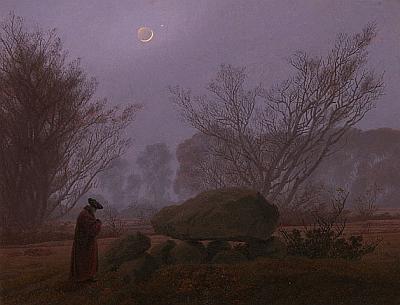
A Walk at Dusk
1830 - 1835
Caspar-David Friedrich
d. May 7, 1840
_______________________
Code and the Technical Provenance of Nihilism
ctheory
Bradley Bryan
The death of God is not obvious. It is the un-heeded event that Nietzsche claimed present in our every act of knowledge from now on, a hidden death known only to those who have come to witness it in the most unlikely of places: libraries, conferences, classrooms, bureaucracies, laboratories. Nihilism, the destiny of thought that captures this event, is not an illusion or something that comes to pass to only a few people and not others; nihilism is not black leather and believing in nothing. Nihilism is something: everything comes to nothing, in a word. And one particular word to witness the becoming-nothing of everything in the life-blood of today's human is "code." The code is the ground of the living being, and the task of what follows is to see the death of God in it. ...(more)
_______________________
Aram Saroyan’s Top Ten on Ubuweb -- Poetry News
May 2010 featured resources on ubuweb:
1. Andy Warhol – The Plastic Exploding Inevitable Newspaper
2. John Cage – Memogram Correspondences
3. Vito Acconci – Two Track (1971)
4. Yvonne Rainer – Hand Movie (1966)
5. Ernst Jandl – Sound Poems
6. Carl Fernbach Flarsheim – Visual Poems
7. Morton Feldman – Audio Works
8. Steve Reich – Score for Pendulum Music, 1968
9. Al Hansen – Incomplete Requiem for W. C. Fields (1966)
10. Ian Hamilton Finlay – Wave/rock
_______________________
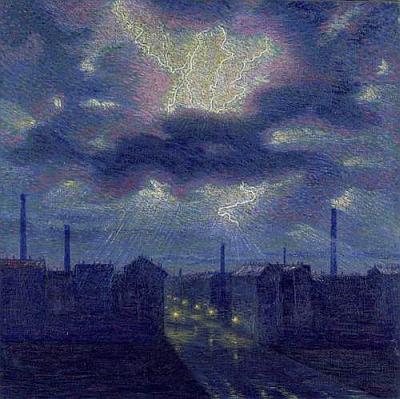
Lightning
Luigi Russolo
1909-10
_______________________
from
Maritime Ode
Álvaro De Campos
(....)
Alone this summer morning on the deserted wharf,
I look toward the bar, I look toward the Indefinite,
I look and am glad to see
The tiny black figure of an incoming steamer.
It’s still far away but distinct, classic in its own way.
It leaves a useless trail of smoke in the air far behind it.
It’s coming in, and the morning with it, and here and there
Along the river maritime life begins to stir:
Sails are hoisted, tugboats advance,
Small boats jut out from behind the anchored ships.
There’s a slight breeze.
But my soul is with what I least see,
The incoming steamer,
Because it’s with the Distance, with Morning,
With the maritime meaning of this Hour,
With the sweet pain that rises in me like a queasiness,
Like the onset of seasickness, but in my soul.
I look at the far-off steamer with great independence of mind,
And in me a flywheel slowly starts spinning.
A Little Larger Than the Entire Universe: Selected Poems Fernando Pessoa Translated by Richard Zenith pdf at aaaarg
_______________________
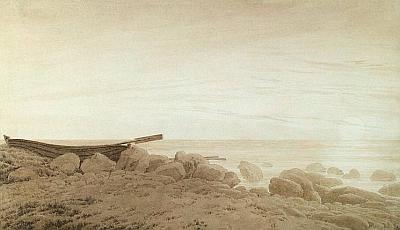
Boat on the Shore
Moonrise
1837/1839
Caspar David Friedrich
_______________________
life
Life Unfurnished
(....)
But if, to this extent, Tolstoy was overambitious, he also went not far enough. He follows the trend of Western philosophical thought in staking all claims on the fact of our death, but forgets in so doing that fact of our life, and all of the ways - more troubling, perhaps, than our wont for neglecting demise - in which we signify ourselves out of it. Dickinson is our instructor here, for these ways are most often forged from as grand a conception of Life as Tolstoy's conception of Death: Life, as punctuated by great moments of celebration, by birthdays, anniversaries, mothers' days and holidays; Life, as captured by some lens or other so that it is no longer mortal; Life, as reported so that it's gone Public, on networking sites that are always switched on; Life, as acknowledged by cards of appropriate theme, carefully sought out and written in and sent off in a task that acquires greater substance than the event to which it would give expression.
To this frenzied party for Life, there is somebody left uninvited and increasingly likely to decamp elsewhere so empty has grown his social calendar. Dressed in clothes too ordinary, blessed with features too undistinguished, with manners more heartfelt than fashionable and tastes too concrete for company, with spirits too temperate and temper too even, life is left out in the cold, and Life, jaunty Life, so sure to arrive in fine style, to say the right thing and to leave just on time, is invited to dine in his stead. ...(more)
thanks Lars

Plantanus occidentalis
Buttonwood
planted 1897
Ottawa
photo - mw
_______________________
A Country Life
Randall Jarrell
A bird that I don't know,
Hunched on his light-pole like a scarecrow,
Looks sideways out into the wheat
The wind waves under the waves of heat.
The field is yellow as egg-bread dough
Except where (just as though they'd let
It live for looks) a locust billows
In leaf-green and shade-violet,
A standing mercy.
The bird calls twice, "Red clay, red clay";
Or else he's saying, "Directly, directly."
If someone came by I could ask,
Around here all of them must know --
And why they live so and die so --
Or why, for once, the lagging heron
Flaps from the little creek's parched cresses
Across the harsh-grassed, gullied meadow
To the black, rowed evergreens below.
They know and they don't know.
To ask, a man must be a stranger --
And asking, much more answering, is dangerous;
Asked about it, who would not repent
Of all he ever did and never meant,
And think a life and its distresses,
Its random, clutched-for, homefelt blisses,
The circumstances of an accident?
The farthest farmer in a field,
A gaunt plant grown, for seed, by farmers,
Has felt a longing, lorn urbanity
Jailed in his breast; and, just as I,
Has grunted, in his old perplexity,
A standing plea.
From the tar of the blazing square
The eyes shift, in their taciturn
And unavowing, unavailable sorrow.
Yet the intonation of a name confesses
Some secrets that they never meant
To let out to a soul; and what words would not dim
The bowed and weathered heads above the denim
Or the once-too-often washed wash dresses?
They are subdued to their own element.
One day
The red, clay face
Is lowered to the naked clay;
After some words, the body is forsaken
The shadows lengthen, and a dreaming hope
Breathes, from the vague mound, Life;
From the grove under the spire
Stars shine, and a wandering light
Is kindled for the mourner, man.
The angel kneeling with the wreath
Sees, in the moonlight, graves.

Randall Jarrell
b. May 6, 1924
Photo by Philippe Halsman
_______________________
Divining the Derivers
Anarchy and the Practice of Derivative Poetics
in Robert Duncan and John Cage
Andy Weaver
Jacket 40
... in spite of these deep biographical similarities, the poems that Duncan and Cage created are actually quite different in many ways. One of the most important differences involves the writers’ use of derivation as a literary technique: Duncan’s derivative poetics revolve around quotation and collage, combining elements from different writers in his own texts, resulting in poems that offer the reader a bricolage, while Cage’s use of derivation focuses mostly on rewriting a source or generant text, re-engaging with the earlier text (in a style that Cage refers to as “writing through”) in such a way that a Cagean derivative poem offers a palimpsest to the reader. Still, in spite of these aesthetic differences, Duncan and Cage offer remarkably compatible and even complementary styles of derivative poetics. An examination of their poetry in combination shows how their derivative poetics serve the same goal (of creating didactic poetry bent on convincing the reader of the ethics of anarchy) through different paths, and it also provides insight into why each writer used a poetics of derivation in the fashion he did. In the end, what the comparison shows is that Duncan’s poetry stresses that the individual is proof of the efficacy of the community, while Cagean derivative poetry illustrates that the community is proof of the efficacy of the individual. The result is that Cage and Duncan provide two sides of the same derivative poetics coin. More importantly, as I will argue in the latter sections of the paper, both Duncan and Cage use their poetics of derivation in service to an anarchist philosophy that calls for and attempts to enact both an ethical relationship between the individual and her community as well as a stance of active attention to the organic order that both Duncan and Cage view as underlying all creation....(more)
_______________________
'ambient' - M/C Journal May 2010
Ambient Thinking: Or, Sweating over Theory
Alison Bartlett
If Continental social theory emerges from a climate of intensely cold winters and short mild summers, how does Australia (or any nation defined by its large masses of aridity) function as an environment in which to produce critical theory and new knowledge? Climate and weather are intrinsic to ambience, but what impact might they have on the conditions of producing academic work? How is ambience relevant to thinking and writing and research? Is there an ambient epistemology?
This paper argues that the ambient is an unacknowledged factor in the production of critical thinking, and draws on examples of academics locating their writing conditions as part of their thinking. This means paying attention to the embodied work of thinking, and so I locate myself in order to explore what it might mean to acknowledge the conditions of intellectual work. Consequently I dwell on the impact of heat and light as qualities specific to where I work, but (following Bolt) I also argue that they are terms that are historically associated with new knowledge. Language, then, is already a factor in shaping the way we can think through such conditions, and the narratives available to write about them. Working these conditions into critical narratives may involve mobilising fictional tropes, and may not always be ambient, but they are potent in the academic imaginary and impact the ways in which we can think through location....(more)
_______________________

Self-Portrait as a Soldier
1915
Ernst Ludwig Kirchner
b. May 6, 1880
_______________________
Gunner
Randall Jarrell
Did they send me away from my cat and my wife
To a doctor who poked me and counted my teeth,
To a line on a plain, to a stove in a tent?
Did I nod in the flies of the schools?
And the fighters rolled into the tracer like rabbits,
The blood froze over my splints like a scab --
Did I snore, all still and grey in the turret,
Till the palms rose out of the sea with my death?
And the world ends here, in the sand of a grave,
All my wars over? How easy it was to die!
Has my wife a pension of so many mice?
Did the medals go home to my cat?
_______________________
Living with diversity: For a politics of hope without fear
An open letter to Europe
Forum of Concerned Citizens of Europe
eurozine
Fear, suspicion and hatred are becoming everyday public sentiments, legitimating vilification and harsh forms of discipline as normal, breeding on endless talk of greedy asylum seekers, disloyal and seditious immigrants, would-be Muslim terrorists, and an illusory desire to return to founding principles and chauvinistic values. A new lexicon of "us versus them" is being rolled out, blaming the victims of unfettered financial speculation, poverty, inequality, and authoritarianism at a global scale, and pretending to ignore how the contribution of immigrants and refugees has been, is and will remain essential to European social, economic and cultural life. A new mentality of "catastrophe management" is being promoted, centred on the containment or elimination of the stranger and non-conformist through extensive surveillance, border controls, curtailment of rights, naming and shaming.
This is a dangerous turn, and as in the darkest moments of its history, Europe runs the risk of waking up too late. We are close to the point of no return from a Europe excessively obsessed with diversity and wrongly blaming difference for its problems. ...(more)
_______________________
Do 'Family Values' Weaken Families?
Jonathan Rauch
The paradox is this: Cultural conservatives revel in condemning the loose moral values and louche lifestyles of "San Francisco liberals." But if you want to find two-parent families with stable marriages and coddled kids, your best bet is to bypass Sarah Palin country and go to Nancy Pelosi territory: the liberal, bicoastal, predominantly Democratic places that cultural conservatives love to hate....(more)
_______________________
STFU: Harper's governance style in four words
Eric Mang
I'd like to thank Conservative Senator Nancy Ruth for her earthy comment. She has, in four short words, epitomized the past four years of the reign of King Stephen the First. "Shut the fuck up" (STFU) explains perfectly this government's mentality toward all you uppity, ornery, outspoken citizens who dare query, question, debate and protest the Conservatives.
STFU is Harper's style of governance (see Murray Dobbin's wonderful 10-part series on Harper's assault on democracy). Senator Ruth's STFU is a gift to all Canadians who have been searching for a bumper sticker phrase to sum up Harper and co's sneering revulsion toward any and all opposition....(more)
_______________________
Top Ten Signs You're a Fundamentalist Christian
EvilBible.com
_______________________
Well Water
by Randall Jarrell
What a girl called "the dailiness of life"
(Adding an errand to your errand. Saying,
"Since you're up . . ." Making you a means to
A means to a means to) is well water
Pumped from an old well at the bottom of the world.
The pump you pump the water from is rusty
And hard to move and absurd, a squirrel-wheel
A sick squirrel turns slowly, through the sunny
Inexorable hours. And yet sometimes
The wheel turns of its own weight, the rusty
Pump pumps over your sweating face the clear
Water, cold, so cold! you cup your hands
And gulp from them the dailiness of life.
_______________________

old Presbyterian Cemetary
Newboro
photo - mw
_______________________
Oh my .....
Anatomy of Criticism: Four Essays
Northrop Frye
pdf at aaaarg - free reg. req.
The Pound Era
Hugh Kenner
pdf at aaaarg - free reg. req. _______________________
The Blanchot Reader
Edited by Michael Hollan
downloadable here
How is Literature Possible?
Maurice Blanchot
Why this fear of commonplaces? It is because, according to terrorist critics, cliches are a sign of laziness and inertia. The writer who takes refuge in them revels in a kind of indolence which subordinates him to ready-made forms. He still believes he is thinking for himself; this is his mistake. He accepts a succession of words which imposes a fixed order upon him and narrowly confines his thought. The use of commonplace expressions thus leads to a serious abuse, which is verbalism. The author who is a victim of conventional sentences is no longer in control of what he is saying. And his words, triumphing over the exact meaning to which they ought to correspond, rebel against the mind which attempts to guide them, weigh upon it with all of their brute force, and make it aware of how degradingly all-powerful that force is. If we reflect on certain words, such as freedom, democracy, order, and on the disorderliness that can result if they are used carelessly, it becomes clear to us that writers have good reason to be vigilant in preventing a facile subservience. Apparendy given over to licence and anarchy, they are in fact engaged in repudiating chance, darkness, confusion, destroying idols and battling with monsters. Terror, in brief, as the enemy of commonplaces and rules, is engaged in a fight against a sickness of language, and in the fear that words, left to themselves and freed from their meaning, might exert over the minds and hearts of men a formidable power, this terror attempts to restore to inspiration and creative force a boundless empire. Jean Paulhan notes that this conception has found in Bergson's philosophy the privileged doctrine which has led it to self-awareness. Following Bergson's advice, it has invited writers continually to resist practical, ordinary language in order to rediscover the fluid forms of a deeper life. It goes beyond apparent logic, fixed by everyday words, in search of an unexpressed and probably inexpressible reality; it strives to break the network of conventions in order to get through to a world that is still innocent; it lays claim to a virginal contact, to brand-new meanings, finding within this aspiration towards an extreme purity the justification for the imperious decrees which cause it to regard with suspicion the savoir-faire and technique proper to all usages of language.
This then is terror, its claims, its hates, its secrets. What are we to think of it? If we look a little more carefully at its grievances, we notice first of all that they don't correspond to the simplest observations and then that they are based on a remarkable kind of illusion. It would be rash to believe that the use of commonplace expressions always presumes laziness or leads to verbalism.
_______________________

photo - mw
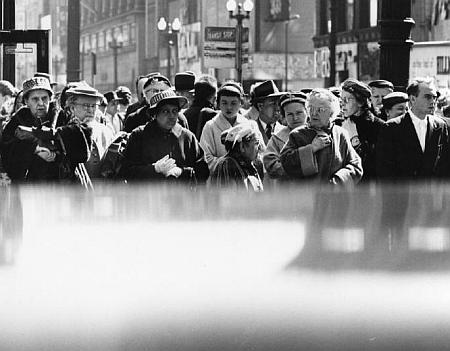
Downtown (Loop)
Charles Swedlund
c.1955
Passing the Torch
The Chicago Students of Callahan and Siskind
Stephen Daiter Gallery via gmtPlus9 (-15)
_______________________
Agyrophobia
Dylan Trigg
side effects
The body continues even when—especially when—we experience a rupture between self and world.
In the street, a kind of murmur completely envelops him; similarly he feels deprived of his freedom as if there were always people present round about him; at the café there seems to be something nebulous around him and he feels to be trembling; and when the voices are particularly frequent and numerous, the atmosphere round him is saturated with a kind of fire, and this produces a sort of oppression inside the heart and lungs and something in the nature of a mist round about his head (Minkowski, cited in Merleau-Ponty).
Murmuring, freedom, nebulousness, trembling, fire, oppression, midst: each of these terms mentioned in Minkowski’s account of anxious spatiality, points to a collision between the lived experience of the world and the formal, objective characteristics occupying the same space. Space becomes transformed by the subject’s placement in the street: equally, the subject himself undergoes transformation as his body becomes enveloped by the street. Both are caught in the prism of an anxious being-in-the-world. But does the experience of bodily anxiety arise prior to being in the street? Does the street touch upon an experience that is already coiled within the subject’s body? The question hinges on a phenomenological analysis of thresholds, of crossing the street....(more)
_______________________
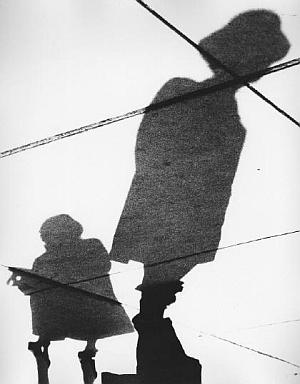
Marvin Newman
1951
Stephen Daiter Gallery
_______________________
The Book of Delusions (chapter 5)
E. M. Cioran
translated with an introduction by Camelia Elias
—Just like when during daytime, when we close our eyes to immerse ourselves in the sudden darkness we discover points of light and bands of color which remind us of the other part of the world, when likewise we descend into the vast and dark depths of our soul, when what is revealed onto us, in the margins of darkness, we find the reflections of an unsuspected golden world. Can these reflections be a calling to our soul or a regret?
—Although space resists us more greatly, more directly and more fatally, it is nonetheless a less essential problem to us than time. Space never becomes a problem of existence or personal relationship. The more we immerse ourselves within our ego, the more space loses its reality, because time persists in our consciousness, and when we have become essentials we move further and further away from time as we did from space.
Space doesn?t give us an intimate feeling of relativity; it only makes us seemingly reflective, on the outside. There are people and even cultures (the Egyptian) who perceive eternity as it is bound up with space, and who do not feel time and its relation to eternity. In their consciousness non-motion and the boundlessness of space exhaust the essential content of the world.
Space overwhelms us; but it doesn?t go through us, even though we are closer to it than we are to time. Only time goes through us, only time leaves us awash, only time do we feel as belonging to us. Time discloses music and music discloses time to us, just as space unveils plasticity to us. But between the plastic and the musical, what soul goes for the first? ...(more)
Hyperion published by the Nietzsche Circle and
edited by Rainer J. Hanshe and Mark Daniel Cohen.
Camelia Elias blogs at Fragments
_______________________
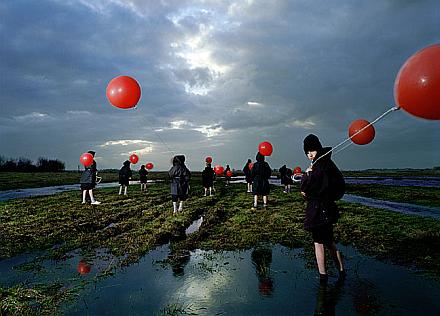
Ellen Kooi
_______________________
There ain't no escape from collapse
Joe Bageant
Others might perceive collapse as banking failure, given their absolute belief that money is the blood of society -- a capitalist hallucination if ever there was one. My point is that many will not even understand that collapse is going on because capitalism will provide excuses and more fake solutions at ever higher prices -- mainly at the expense of the world's poor and defenseless of course -- until it can no longer extract from them through banking, military force, or other means. This slows down the inevitable and helps the western world maintain its disastrous belief systems.(....)
There is no escape in the sense Americans and European culture thinks of escape. Which is mainly running away to a place where you will get something for nothing in a new and different way -- in this case, security and safety from the storm -- and also keep some or most of the stuff and gadgetry and ease that has come to represent "quality of life."...(more)
_______________________
A coalition solution to Canada's democracy crisis
Murray Dobbin
Canada is in the midst of a crisis in democracy unique in its history. There is simply no other historical example that one can compare it to. It is multi-faceted and it affects every aspect of our national politics and political discourse. It is inexorably eroding the political fabric of the country and therefore our viability as a democratic nation.
First, we have a government so contemptuous of democracy that it is utterly unapologetic in trying to impose on the country an agenda opposed by probably 75 per cent of the population -- treating its minority status not as a mandate to work with other parties but as an irritating impediment to re-engineering the country along the lines defined by the U.S. Christian right.
Second, we are amongst a tiny handful of countries still saddled with the absurdly anachronistic voting system that allows for government by executive dictatorship by any party that can get 40 per cent of the vote.(....)
The only way out of this impasse -- for the Liberals and the country -- is clear to everyone except the one person and party critical to making it happen. The solution to all of these elements of the democratic crisis is the implementation of proportional representation, preceded by a formal commitment by the opposition parties to form a coalition government after the next election. A coalition of Liberals and the NDP, based on a signed accord committing both to a minimum but substantive legislative agenda, and supported informally by the Bloc is not just one possible strategy to rid the country of Stephen Harper and his wrecking crew. It is the only strategy....(more)
_______________________

Architecture Under Construction
Photographs by Stanley Greenberg
The University of Chicago Press
_______________________
Calamity Comes Home
Steve Himmer
And when they found her on her back in the coal shed behind the station, three railwaymen with just a few minutes in town lined up to each take a turn…the shame should have driven her out of town on the train.
…..But no, she’s still drinking and cussing in the saloon every night. Riding that heaving and steaming beast of a horse in those horrible trousers of hers. Still shooting bottles off every fencepost in town, waving all shapes and sizes of gun in positions you’d never think up on your own — trickshots you can’t shoot with the pistols respectable ladies keep tied to one leg on a ribbon. Each bullet in her chamber is one more blow to a blown reputation, but she goes on as if she doesn’t know....(more)
Emprise Review - Volume 14
Steve Himmer blogs at tawny grammar and edits Necessary Fiction
_______________________
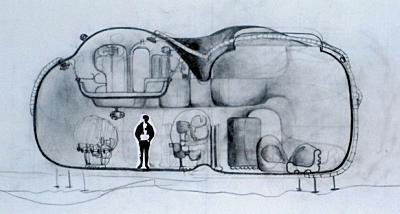
Living Pod
The Archigram Archival Project ... makes the work of the seminal architectural group Archigram
available free online for public viewing and academic study. via BlurryYellow
_______________________
The Tea Party's Toxic Take on History
Ignore it at your peril.
Ron Rosenbaum
Most people with a basic grounding in history find Tea Party ignorance something to laugh about, certainly not something to take seriously. But I would argue that history demonstrates that historical ignorance is dangerous and that it can have tragic consequences, however laughable it may initially seem. And thus the media, liberals, and others are misguided in laughing it off. And educated conservatives are irresponsible in staying silent in the face of these distortions. ...(more)
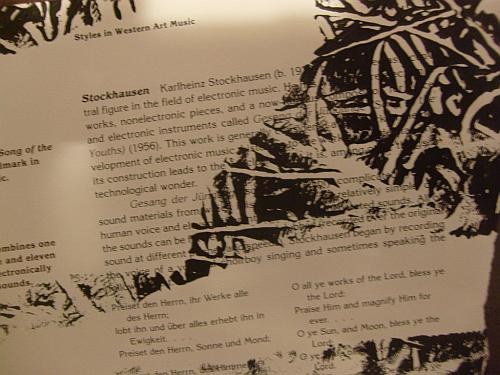
imprint
textimagepoem
Jim Leftwich
_______________________
From Bill Moyers Final Broadcast:
Plutocracy and Democracy Don't Mix
Ed Murrow told his generation of journalists bias is okay as long as you don't try to hide it. So here, one more time, is mine: plutocracy and democracy don't mix. Plutocracy, the rule of the rich, political power controlled by the wealthy.(....)
... like those populists of that earlier era, millions of Americans have awakened to a sobering reality: they live in a plutocracy, where they are disposable. Then, the remedy was a popular insurgency that ignited the spark of democracy.
Now we have come to another parting of the ways, and once again the fate and character of our country are up for grabs.
So along with Jim Hightower and Iowa's concerned citizens, and many of you, I am biased: democracy only works when we claim it as our own....(more)
via Riley Dog
_______________________
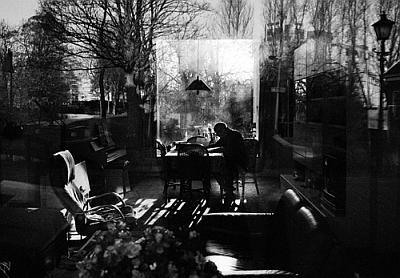
Frank van Wijngaarden
_______________________
Permeable Membrane
Adrienne Rich
(....)
3.
In the culturally stunned, dystopic states of North America a poet needs a different (though no greater) kind of faith and commitment from that of poets under other cruel and t/ruthless political regimes. Faith in poetry itself, more perhaps than has been required in other, older societies. Commitment to a poetics not defined by the market, not complacent courtier verse or prose cut by template. A poetics of longing, of organic necessity.
(....)
4.
There’s a permeable membrane between art and society. A continuous dialectical motion. Tides brining the estuary. River flowing into sea. A writer describes the landmass-“stained” current of the Congo River as discernible three hundred miles out on the ocean. Likewise: the matter of art enters the bloodstream of social energy. Call and response. The empathetic imagination can transform, but we can’t identify precise loci of transformation, can’t track or quantify the moments. Nor say how or when they lead, through innumerable unpredictable passageways, toward recreating survival, undermining illegitimate power and its cruelties.
Nor how newly unlocked social energies, movements of people, demand a renewed social dialogue with art: a spontaneous release of language and forms.
René Char: The poet bursts the bonds of what he touches. He does not teach the end of bonds.
She cannot teach the end of bonds; but she can refuse to justify, accord with, ignore their existence....(more)
_______________________
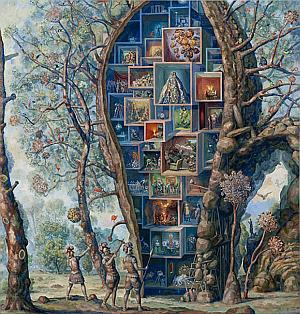
Self Portrait as Tree House
2010
Julie Heffernan
P·P·O·W
_______________________
Tree of Diana
Alejandra Pizarnik
(translated by Jason Stumpf)
octopus 13
1
I’ve leapt from myself to the dawn.
I’ve left my body with the light
and sung the sorrow from which it’s born.
2
These are the versions we propose:
a hole, a wall that shakes…
3
only thirst
silence
never found
beware my love
beware the quiet in the desert
the traveler with the empty glass
and the shadow of her shadow
...(more)
_______________________
The Lightkeeper
Carolyn Forché
A night without ships. Foghorns called into walled cloud, and you
still alive, drawn to the light as if it were a fire kept by monks,
darkness once crusted with stars, but now death-dark as you sail inward.
Through wild gorse and sea wrack, through heather and torn wool
you ran, pulling me by the hand, so I might see this for once in my life:
the spin and spin of light, the whirring of it, light in search of the lost,
there since the era of fire, era of candles and hollow-wick lamps,
whale oil and solid wick, colza and lard, kerosene and carbide,
the signal fires lighted on this perilous coast in the Tower of Hook.
You say to me stay awake, be like the lensmaker who died with his
lungs full of glass, be the yew in blossom when bees swarm, be
their amber cathedral and even the ghosts of Cistercians will be kind to you.
In a certain light as after rain, in pearled clouds or the water beyond,
seen or sensed water, sea or lake, you would stop still and gaze out
for a long time. Also when fireflies opened and closed in the pines,
and a star appeared, our only heaven. You taught me to live like this.
That after death it would be as it was before we were born. Nothing
to be afraid. Nothing but happiness as unbearable as the dread
from which it comes. Go toward the light always, be without ships.
via the page
_______________________

Frank van Wijngaarden
_______________________
A language that once sent ravens through firs. The open world from which it came.
Words holding the scent of an asylum fifty years. It is fifty years, then.
The child hears from within: Come here and know, below
And unbeknownst to us, what these fields had been.
- Carolyn Forché, Sequestered Writing
Carolyn Forché at The Poetry Foundation

Et in Arcadia, Oil!
Darwin BondGraham
_______________________
Opus Hermeticum
Robert Kelly
Barzakh
(....)
2.
Hermetic habits — wearing live fish, birds
squawk on your epaulettes — reveal the Operator
at his best: in disguise, vesti, all imposture
and tweed cloaks, silk-lined assistants,
wings. Some of us have wings. The sonnet
of course is the ideal hermetic form, twos
and sevens and eights and sixes, threes,
a sleekit timorous Babbage’s Machine
to think our way through Feelings to the Will.
A gizmo to think with! After a lot of heat
you get an animal that thinks like you,
that crawls out of the oven exhausted from love
soon wakes to new life, yours, till you can’t
tell it from a looking-glass, except it smells.
(But by that point you smell too.)
...(more)
.....................................................
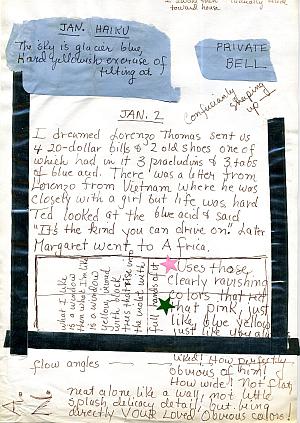
Alice Notley: Collages
Barzakh - Issue # 1 via Pierre Joris
includes work by Alice Notley & Ted Berrigan, Barbara Jane Reyes, Michel Deguy, Latasha N. Nevada Diggs, Robert Kelly, Jerome Rothenberg, Habib Tengour, Jed Rasula, Edwin Torres, Rodrigo Toscano, and more.
_______________________
Very Little....Almost Nothing
Death, Philosophy, Literature
Simon Critchley
pdf at aaaarg - free reg. req.
Lecture 1
Il y a
Just as the man who is hanging himself, after kicking away the stool on which he stood, the final shore, rather than feeling the leap which he is making into the void feels only the rope which holds him, held to the end, held more than ever, bound as he had never been before to the existence he would like to leave. (Thomas the Obscure, revised version) Reading Blanchot is, in a sense, the easiest of tasks. His French is limpid and clear, it is daylight itself; almost the French of the Discours de la méthode. And yet, as nearly everyone who writes on Blanchot points out, his work seems to defy any possible approach, it seems to evade being drawn into the circle of interpretation. The utter clarity of Blanchot’s prose would appear to be somehow premised upon a refusal of the moment of comprehension and the consequent labour of interpretation and judgement. Absolutely clear at the level of reading, yet fundamentally opaque at the level of comprehension; a vague fore-understanding that somehow resists being drawn up into an active comprehension.
Reading Blanchot, and this will be my only hypothesis in what follows, one is drawn from daylight into an experience of the night. An experience of the night which is not the sleep which blots out and masters the night, preparing the body for the next day’s activity – the sleep of Dasein, of heroes and warriors, that allows the night to disappear and transforms it into a reserve of possibility. The latter is what Blanchot calls the first night, the night in which one can go unto death, a death one dies each time sleep comes – sleep as mastery, as virility unto death.
Reading Blanchot one is led rather into an experience of the other or essential night, the night which does not permit the evasion of sleep, the night in which one cannot find a position, where the body refuses to lie still – this is the spectral night of dreams, of phantoms, of ghosts. In the other night, one can neither go to sleep nor unto death, for there is something stronger than death, namely the simple facticity of being riveted to existence without an exit, what Blanchot calls le mourir in opposition to la mort: the impossibility of death (ED 81). In the other night, one is not permitted the fantasy of suicide, that controlled and virile leap into the void that believes the moment of death is a possibility that can be mastered; a perverse version of the belief that one can die content, in one’s bed, with one’s boots on. In place of the mastered leap into the void, all the suicide feels is the rope tightening around his neck, binding him ever tighter to the existence he wanted to leave. This condition of being riveted to existence is also the experience of insomnia, a reluctant vigilance in the night, the night that slowly exhausts and sickens the body, thereby preventing sleep the following night and thus engaging insomnia’s vicious circle. This is the bodily recollection of the night that one carries around during the day like a thousand invisible aching scars – eyes quietly burning beneath closed lids. Blanchot’s original insight, obsessively reiterated in his work, is that the desire that governs writing has for its (impossible) origin this experience of the night, which is the experience of a dying stronger than death, what Levinas will call, and I will keep coming back to this, the il y a. _______________________

Mausoleum
Buenos Aires
Stephen Downes' photosets on Flickr
Stephen's Web
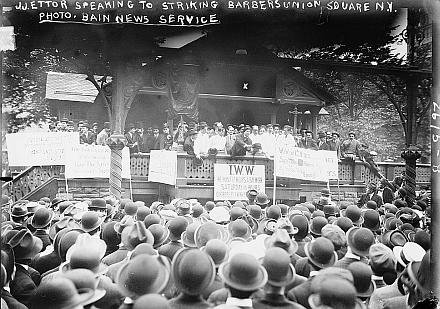
J.J. Ettor speaking to striking barbers
Union Sq., N.Y. , May 16, 1913
LOC
_______________________
May Day 2010: Events in solidarity with workers
Mayworks Kingston 2010
May 1 - 9, 2010
Mayworks Festival of Labour and the Arts
Winnipeg, MB
May 1 - 30, 2010
Mayworks Festival of Working People and the Arts
Toronto
May 1-30, 2010
May Day Connections
Neale Towart
The Origins and Traditions of May Day
Eugene Plawiuk
The Incomplete, True, Authentic and Wonderful History of MAY DAY
Peter Linebaugh
1904 Labor Day Parade
Thomas Edison
youtube

Women's Auxilliary Typographical Union
Labor Day parade, NYC
1909
_______________________
The Nights of Labor: The Workers' Dream in Nineteenth Century France
Jacques Rancière
translated by John Drury
pdf at aaaarg - free reg. req.
Readers should not look for any metaphors in my tide. I am not going to call up the pains of manufacture's slaves, the unhealthiness of workingclass slums, or the wretchedness of bodies worn out by untrammeled exploitation. There will be no exposition of aU that here, except through the glances and the words, the dreams and the nightmares, of the characters who will occupy our attention.
Who are they? A few dozen or hundred laborers in their twenties around 1830, who decided, each for himself, just about that time that they would no longer tolerate the intolerable. What they found intolerable was not exactly the poverty, the low wages,. the uncomfortable housing, or the ever-present specter of hunger. It was something more basic: the anguish of time shot every day working up wood or iron, sewing clothes, or stitching footwear, for no other purpose than to maintain indefinitely the forces of servitude with those of domination; the humiliating absurdity of having to go out begging, day after day, for this labor in which one's life was lost. There was the oppressive weight of other people as well: the workshop crew with their strut as barroom he-men or their obsequious pose as conscientious workers; the workers waiting outside for a position one would be only too glad to turn over to them; and, finally,. the people passing by in carriages and casting disdainful glances at this blighted patch of humanity.
To finish with that, to know why one had not yet finished with it, to change one's life.: turning the world upside down begins around the evening hour when normal workers should be tasting the peaceful sleep of people whose work scarcely calls for thinking. This particular evening in October 1839, for example-at 8:00 P.M. to be exact-our characters would be meeting at tailor Martin Rose's place to start a workers' journal. _______________________

May Pole
(circa 1907)
|
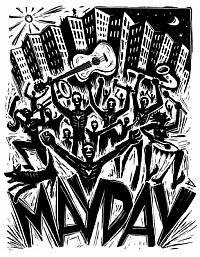
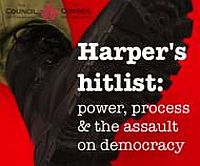

 Janus Head
Janus Head

 The Age of Briggs & Stratton
The Age of Briggs & Stratton




















































